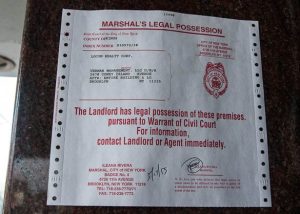 As the moratorium on eviction cases in New York State due to the COVID-19 pandemic fades into memory, our firm has resumed regular operations regarding landlord-tenant law. In general, this means eviction cases when a tenant may have stayed past the expiration of his lease (known as holdover actions), and those when a tenant is in violation of his lease, usually due to failure to pay rent (non-payment actions).
As the moratorium on eviction cases in New York State due to the COVID-19 pandemic fades into memory, our firm has resumed regular operations regarding landlord-tenant law. In general, this means eviction cases when a tenant may have stayed past the expiration of his lease (known as holdover actions), and those when a tenant is in violation of his lease, usually due to failure to pay rent (non-payment actions).
The question this blog post will address is what happens at the end of an eviction action that allows a tenant to be removed from the premises. In order to evict any tenant, the Court must issue a Judgment and a Warrant of Eviction. This can occur in several ways. The first is if the tenant fails to appear in Court, and the Court then issues a default judgment against the tenant. Conversely, if the tenant does appear, the case may eventually go to trial before the Court. If the landlord prevails at trial, again, the Court will allow entry of a Judgment against the tenant.
Finally, it is possible that the parties will agree to a settlement of the action. Usually, that is through the execution of a Stipulation of Settlement. In general, a Stipulation is a compromise of the case. The tenant may agree to leave the premises at a future date certain. For example, if the case is brought in early January, the attorneys for parties may agree that the tenant may vacate the property on or before March 31st. There may be other aspects of the case that are addressed in a Stipulation of Settlement, such as any rent arrears due from the tenant. The agreement may allow the tenant to pay such arrears over time, and, assuming he complies with the payment terms, the landlord may withdraw his case when full payments are made pursuant to the Stipulation.
A Judgment entered against a tenant, whether by default, verdict at trial, or under the terms of a Settlement, may also include a money judgment. If the tenant still owes money for rent payments that are in arrears, the landlord may ask the Court to enter the amount owed in the Judgment entered against the tenant. Such a monetary judgment is subject to collection against the tenant, regardless of whether he vacates the premises.
More significantly, a Judgment entered in landlord-tenant Court will provide that the Court will also execute a Warrant of Eviction. The Warrant of Eviction is a separate document that allows a City Marshal or Sheriff to physically evict the tenant and remove the tenant’s belongings from the leased premises. The Judgment entered by the Court may contain a “stay” (a legal delay) on the execution of the Warrant of Eviction. For example, if the parties agree that the tenants must vacate on or before March 31, the Judge may order that the Warrant of Eviction may be entered immediately, but stay execution until April 1, if the tenant does not vacate by March 31. This allows a landlord to obtain a Warrant immediately when an action is settled, and gives the tenant incentive to comply with the settlement terms before the Warrant of Eviction is executed.
Our firm has extensive experience in obtaining Judgments and Warrants of Eviction, and welcomes all inquiries.
 New York Real Estate Lawyers Blog
New York Real Estate Lawyers Blog

